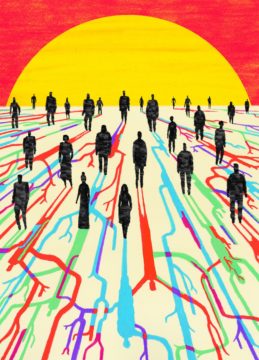Gideon Lewis-Kraus in The New Yorker:
 Moments of sociopolitical tumult have a way of generating all-encompassing explanatory histories. These chronicles either indulge a sense of decline or applaud our advances. The appetite for such stories seems indiscriminate—tales of deterioration and tales of improvement are frequently consumed by the same people. Two of Bill Gates’s favorite soup-to-nuts books of the past decade, for example, are Steven Pinker’s “The Better Angels of Our Nature” and Yuval Noah Harari’s “Sapiens.” The first asserts that everything has been on the upswing since the Enlightenment, when we learned that rational argument was preferable to religious superstition and wanton cudgelling. The second concludes that everything was more or less O.K. until about twelve thousand years ago, when we first beat our swords into plowshares; this innocent decision, which must have seemed a good idea at the time, heralded an era of administrative hierarchy, state-sanctioned violence, and the unchecked proliferation of carbohydrates. Perhaps what readers like Gates find valuable in these books has less to do with the purported shape and direction of history than with the broad assurance that history has a shape and a direction.
Moments of sociopolitical tumult have a way of generating all-encompassing explanatory histories. These chronicles either indulge a sense of decline or applaud our advances. The appetite for such stories seems indiscriminate—tales of deterioration and tales of improvement are frequently consumed by the same people. Two of Bill Gates’s favorite soup-to-nuts books of the past decade, for example, are Steven Pinker’s “The Better Angels of Our Nature” and Yuval Noah Harari’s “Sapiens.” The first asserts that everything has been on the upswing since the Enlightenment, when we learned that rational argument was preferable to religious superstition and wanton cudgelling. The second concludes that everything was more or less O.K. until about twelve thousand years ago, when we first beat our swords into plowshares; this innocent decision, which must have seemed a good idea at the time, heralded an era of administrative hierarchy, state-sanctioned violence, and the unchecked proliferation of carbohydrates. Perhaps what readers like Gates find valuable in these books has less to do with the purported shape and direction of history than with the broad assurance that history has a shape and a direction.
Both stories, after all, adhere to a model of history that’s at once teleological (driven by specific forces to arrive at the foreordained present) and discontinuous (such magical things as farming and rationality emerged from the woodwork, unlocking successive stages of developmental maturity). They generally agree that the crucial rupture divided some original state of nature from the grand accession of civilization. Their arcs of irrevocable decline or compulsory progress are variations on themes that were given their most recognizable modern elaborations by Thomas Hobbes and Jean-Jacques Rousseau. Pinker takes up the Hobbesian notion that early human existence was a brutish war of all against all. Harari takes rather literally Rousseau’s thought experiment that we were born free and rushed headlong into our chains. (“There is no way out of the imagined order,” Harari writes. “When we break down our prison walls and run towards freedom, we are in fact running into the more spacious exercise yard of a bigger prison.”) In both accounts, guilelessness and egalitarianism are exchanged for knowledge and subordination; the only real difference lies in the cost-benefit assessments of that trade.
About a decade ago, the anthropologist and activist David Graeber, who died suddenly last year, at the age of fifty-nine, and the archeologist David Wengrow began to consider, in the wake of Occupy Wall Street, how they might contribute to the burgeoning literature on inequality. Not inequality of income or wealth but inequality of power: why so many people obey the orders of so few.
More here.
